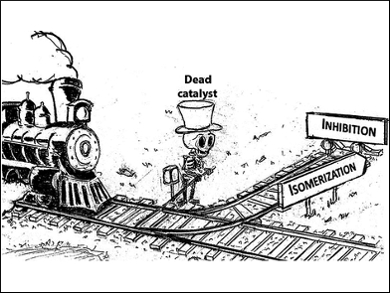Catalyst deactivation is a problem of particular importance for industrial-scale processes, where catalyst loads are typically low and small amounts of inhibitors can be a significant issue. Olefin metathesis reactions catalyzed by ruthenium complexes suffer particularly from catalyst decomposition and deactivation.
Renat Kadyrov, Evonik Resource Efficiency GmbH, Hanau-Wolfgang, Germany, has investigated the ring-closing metathesis (RCM) of N,N-diallyl-tosylamide and allyl-N-10-undecenenoyl-l-proline using low concentrations of ruthenium catalyst. The results showed that the desired reaction product can undergo double-bond isomerization under the reaction conditions, and the isomerized product can act as a catalyst inhibitor.
This was proven by artificially adding the isomerization product to the reaction mixture, which decreased catalyst activity drastically. The species trap the catalyst in an inactive Fischer-type carbene complex. These results could help in the planning of successful strategies for syntheses involving metathesis reactions that avoid catalyst inactivation.
- Olefin Metathesis: Catalyst Inhibition as a Result of Isomerization,
Renat Kadyrov,
ChemCatChem 2015.
DOI: 10.1002/cctc.201501081




